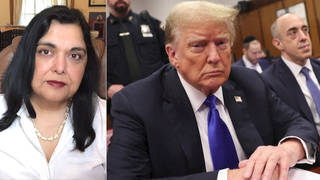
Topics
Guests
- Katherine FrankeColumbia University law professor who directs the Center for Gender and Sexuality Law. She’s also the author of the book Wedlocked: The Perils of Marriage Equality.
On Tuesday night, vice-presidential candidates Virginia Senator Tim Kaine and Indiana Governor Mike Pence sparred over the economy, foreign policy and healthcare during the only vice-presidential debate. Democracy Now! hosted a roundtable of guests, including Columbia University law professor Katherine Franke, who directs the Center for Gender and Sexuality Law. She spoke about Governor Mike Pence’s record on one of the most contentious campaign issues this year: reproductive rights and the religious views of Pence and Kaine.
Transcript
AMY GOODMAN: Democracy Now!’s Nermeen Shaikh and I also spoke to Columbia University law professor Katherine Franke, who directs the Center for Gender and Sexuality Law. She spoke about Governor Mike Pence and his record on reproductive rights and Planned Parenthood.
KATHERINE FRANKE: As governor, he cut all of the money, the funding, to Planned Parenthood in the state of Indiana, and it resulted in the closing of all of their clinics. What resulted from that? Since these clinics did reproductive rights work, certainly, and family planning work, certainly, but they also did HIV testing and counseling—and as a result of the closing of these—of the Planned Parenthood clinics, the HIV rate, infection rate, skyrocketed in Indiana. And this was in—all over the news. And so, the anti-abortion crusade has a ripple effect much farther out beyond just the issue of abortion itself.
NERMEEN SHAIKH: And, Katherine Franke, can you say a little about Tim Kaine and, in particular, his Catholicism, in the context of positions he’s taken both on abortion and the death penalty?
KATHERINE FRANKE: Yeah, it’s such an interesting question. Both of these vice-presidential candidates profess, sincerely, to be devout Christians—Mike Pence, a evangelical Protestant, and Tim Kaine, a Catholic.
AMY GOODMAN: I mean, Mike Pence famously said, “I am a Christian, I’m a conservative, and I’m a Republican—in that order.”
KATHERINE FRANKE: “In that order,” that’s right. And what I think we’re seeing in these two candidates are two faces of Christianity in this country, one with Mike Pence, where Christianity is really being weaponized as a way to justify a range of discrimination, small-minded, mean, xenophobic thinking, and in the case of Tim Kaine, a different kind of Christianity, what I would call a more catholic way—with a little C—of thinking faith and thinking brotherly love, if you will, a Christianity of compassion, of care, of responsibility to those who are the weakest. You may remember that when he was in law school, he left for a year and went to Honduras to do volunteer work there. You know, if one my students said they would like to do that at Columbia, I would welcome it, whether they were Catholic or not. But I think Tim Kaine’s Catholicism runs very deep for him as a sense of—out of a sense of responsibility and public service. And what I see in Mike Pence is the way in which religion passes as a justification for thinking the world in old-fashioned, perhaps, ways that never existed before, but in narrow-minded ways and often hateful ways. And it’s a—it’s a real contrast between the two. Now, Kaine does say that in his own personal faith he’s opposed to abortion and he’s also opposed to the death penalty, but he also says that as a public official, as an elected official, his obligation is to abide by the law and the Constitution. I don’t see that from Mike Pence.
AMY GOODMAN: That’s Columbia University law professor Katherine Franke. To watch our full “Expanding the Debate” special from Tuesday night, visit democracynow.org. It was three-and-a-half hours. We aired the full debate and, again, gave the Green Party vice-presidential nominee, Ajamu Baraka, a chance to respond to every question in real time.
We had also invited William Weld of the Libertarian Party; he didn’t take us up on the invitation. In that special, we also spoke to Intercept journalists Lee Fang and Zaid Jilani; attorney Chase Strangio of the ACLU’s LGBT and AIDS Project; Naila Awan, the civil and human rights lawyer at Demos; and Andrew Bacevich, retired colonel and Vietnam War veteran, his latest book, America’s War for the Greater Middle East: A Military History.
Tune in Sunday for Democracy Now!’s “Expanding the Debate” coverage of the next Donald Trump-Hillary Clinton debate, the second of three presidential debates.
That does it for our show today. Our website is democracynow.org. And you can follow us on Facebook, as well as Instagram, Twitter and all different forms of social media. And tell your friends about Democracy Now!, people-powered media.












Media Options